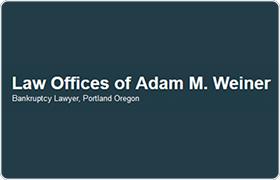Colton Bankruptcy & Debt Lawyer, Oregon
Sponsored Law Firm
-
 x
x

Click For More Info:
-
Law Offices of Adam M. Weiner
8624 SE 13th Ave Portland, OR 97202» view mapBankruptcy & Debt Premier Bankruptcy Attorney
Life doesn’t always have to be hard. Consult with a bankruptcy attorney who looks out for your best interests. Call today to begin the process for a fresh financial start.
503-719-5123
FREE CONSULTATION
CONTACTMatthew A. Casper
Litigation, Consumer Protection, Dissolution, Commercial Bankruptcy
Status: In Good Standing
FREE CONSULTATION
CONTACTFREE CONSULTATION
CONTACTJoseph Quincy Kaufman
Business, Intellectual Property, Estate, Bankruptcy & Debt
Status: In Good Standing Licensed: 37 Years
Michael Dirk Mc Nichols
Bankruptcy, Civil Rights, Estate Planning, Business & Trade
Status: In Good Standing Licensed: 32 Years
David Smith
Corporate, Business Organization, Banking & Finance, Collection
Status: In Good Standing Licensed: 28 Years
Lawrence A Castle
Wills & Probate, Family Law, Consumer Protection, Civil & Human Rights, Bankruptcy
Status: In Good Standing Licensed: 39 Years
Larry J Lunas
Commercial Real Estate, Real Estate, Trusts, Bankruptcy
Status: Inactive Licensed: 46 Years
Sarah Anne Rockwell
Family Law, Business & Trade, Consumer Bankruptcy, Personal Injury
Status: In Good Standing Licensed: 13 Years
 Adam M. Weiner Portland, OR
Adam M. Weiner Portland, OR Practice AreasExpertise
Practice AreasExpertise
